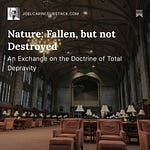I received the following response twice since posting my critique of Common Grace Theology (CGT): “Can’t we just say ‘common grace,’ even if we mean nature?” This response led me to consider a connection to the philosophy of language, the subject of my PhD dissertation. There, a prominent debate concerns a distinction between sense and reference, the meaning of a term and the thing it refers to. When we have two ways of referring to the same thing, these share a referent (thing referred to) while differing in sense (connotation, meaning, etc.). This prompts a question: Aren’t “Common Grace” and “Nature” two ways of referring to the same thing?
In my dissertation, I am pushing toward a view that reduces meaning or sense to reference, in a great many cases. On that view, the difference in sense between “common grace” and “nature” would just disappear because of the prominence of their referring to the same reality. However, here, I am inclined to distinguish quite strongly the connotations and “baggage” of each term.
The response to my post was, again, “Can’t we just use the term ‘common grace’ to refer to this phenomenon, even if we are thinking ‘nature?’” Our hearer might import secularist connotations to the word “nature” and not hear us out on the point we are trying to make. On this view, its merely “semantic,” and we can use either word to refer to the same thing, depending on our context.
But what is this thing to which we refer by, alternatively, “nature” and “common grace?” Arguably, it is the good things of the created world between the fall and the consummation, and outside the bounds of the church.
However, “nature” and “common grace” are not actually ways of referring to those good things, but of explaining them. We read something helpful in a secular psychology book. “Common grace!” one person chimes. “The book of nature,” another intones. These are alternative and competing explanations of the phenomenon, not names for it.
And if “nature” and “common grace” are competing explanations of the good things outside the church, then it is not a matter of mere semantics which one one utters in context. What explains these good things? Nature, or common grace? Is nature sufficient to explain these, or is it insufficient, requiring at least supplementation by common grace?
This Christian debate parallels the secular debate between evolutionary psychologists and social constructionists: Are the phenomena of human society explained by nature (biology, evolution) or by social construction? Social constructionists, like common grace theologians, find something ideologically suspect in appeals to nature. While the common grace theologians see “nature” as a “secularist stalking-horse,” social constructionists, following Foucault, see it as a mask of power. In either case, they reduce nature to something minimal, empty, or non-existent, in theology, “a vacuole for grace,” in social science, “a blank slate.” The parallel should give Common Grace Theologians pause.
The development of an empty notion of nature is itself socially constructed. It is the fruit of modernity. Modern philosophy, following Descartes, emptied nature of its depth and integrity, reducing it to the mechanical inhabitants of a three-dimensional grid. Postmodern philosophy has denied even this, arguing that there is no reality, truth, or nature; all is up to the human and social will.
All of this is an abandonment of the ancient notion of nature as something with such integrity that “living in accord with nature” might provide an exhaustive ethic, so Socrates, Plato, Aristotle, the Epicureans, the Stoics, the apostle Paul, and the main classical Christian theological tradition, culminating in Aquinas. Why do Common Grace Theologians side with this modernist abandonment of Nature?
But what if “common grace” does not mean a denial of the explanatory role of nature? Perhaps, we could simply speak of things operating in accord with their nature, when God could have let the fall have its full effect, leading to the destruction of things. Here, nature has integrity, but we attribute it to God’s hand that nature is even still around to operate, post-fall.
This is true. As I said previously, there are other terms for this than “grace”: Mercy, providence, patience, forbearance. And “grace” is not forbidden as a word for such things. But it is the wrong word in this context. “Common grace” implies that the good gifts in the redemptive-historical interim have a character akin to that of “the special operations of the Spirit,” or the work of the Spirit in those in whom he produces “temporary faith.” It implies, in short, that the good gifts in the created order are a spillover of special grace, that is, saving grace and the work of the Holy Spirit.
It should also be mentioned that the use of the word “grace” to refer to an actual principle, the sanctifying power of the Holy Spirit, has a solid place in the theological tradition. This means that its use strongly implies direct activity on God’s part within an individual. And I do not mean to deny God’s direct activity in giving us these gifts.
But to explain all good things outside the church between fall and consummation by “common grace” effectively does deny nature its own place. For example, given human nature and the natural law, the fact that a great many societies have codified much of the natural law or have exhibited strong sociality and cooperation must be explained in terms of nature. God’s provident allowance of nature to continue and flourish can be considered as a sine qua non, but it is not the principle of the thing. To insist upon common grace’s explanatory role in an attempt to exalt God’s activity is to denigrate God’s activity in creation and as sustainer and provider for his creation. Is such sustaining and providential activity ordered to salvation? Absolutely. But of itself, it is in accord with and fully explained by nature itself, God’s handiwork.
There is an irony here: The last time the Reformed vigorously debated “common grace,” with some denying “common grace” altogether, the opponents of common grace were concerned that it did not respect the depth of total depravity, that it excused participation in worldly things, and sanctified things outside the church. The previous opponents of common grace, hyper-Calvinists, denied both common grace and nature. (Though I am pleased that they did recommend the word “providence” in place of “common grace.”)
We theologians of nature oppose “common grace” for exactly the opposite reason. “Common grace” implies far too strong a view of the fall, as having destroyed nature such that it explains none of the good in our world at all.
“Common grace” and “nature” are not two names for the same thing. They are competing explanations of one thing: The fact that there is good in the world outside the domain of God’s saving grace.
















Share this post